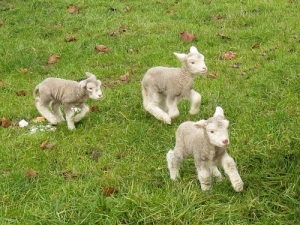Move over ham, here comes lamb
It’s official, lamb will take centre stage on Kiwi Christmas tables this year.
 BLNZ's Lamb Crop 2015 report estimates 23.9 million lambs were tailed this spring – the smallest lamb crop since 1953.
BLNZ's Lamb Crop 2015 report estimates 23.9 million lambs were tailed this spring – the smallest lamb crop since 1953.
White the lamb crop is the lowest since 1953, sheep farmers have become much more productive, says Beef + Lamb NZ chief economist Andrew Burtt.
He says there is still constant tension and pressure to improve efficiency and productivity.
"Farmers have responded to the signals from processors about lambs in tight specifications. That sort of thing will just continue," he adds.
BLNZ's Lamb Crop 2015 report estimates 23.9 million lambs were tailed this spring – the smallest lamb crop since 1953. Lamb export receipts for 2015-16 are estimated at $2.8 billion, down 4.2% on 2014-15.
Burtt says demand, overseas markets, currency rates and interest rates are constantly moving factors that farmers do not directly control.
"Their best focus is on the things they do have some control over, which is their productivity in getting the weights desired by their customers, the meat companies. They're doing the best they can do as efficiently as possible."
The overall focus is an increasing demand to grow animals to specifications.
He says sheep numbers fell because of key factors like drought; and dairy cows are expected to have the first noticeable downturn in a long time – driven by prices and drought. However, the decline in beef cattle numbers has slowed substantially.
"But sometimes we miss the story if we focus solely on the number of sheep or beef cattle," Burtt adds.
"We miss the productivity improvements through farm management and pasture management; all farmers know about El Nino and make and implement their plans to deal with El Nino should it eventuate.
"There are some [farmers] in Hawkes Bay who say it has rained so much at present that 'if this is El Nino bring it on'. Nevertheless they are working on the prospect of dry conditions later in the year.
"I think that responsiveness and resilience to these sorts of things is getting stronger and stronger in the industry, nevertheless there are still improvements in confidence needed."
Regarding the Silver Fern Farms investment by the Chinese company Shanghai Maling, Burtt says it shows there is enough confidence in the industry for people to invest in it.
Coming in at a year-end total at 3088 units, a rise of around 10% over the 2806 total for 2024, the signs are that the New Zealand farm machinery industry is turning the corner after a difficult couple of years.
New Zealand's animal health industry has a new tool addressing a long-standing sustainability issue.
The Government has announced that ACC will be a sponsor of this year's FMG Young Farmer of the Year competition.
As veterinary student numbers grow to help address New Zealand's national workforce shortge, Massey University's School of Veterinary Science is inviting more veterinary practices to partner in training the next generation of vets.
South Island dairy farmers will soon be able to supply organic milk to Fonterra.
Norwood has announced the opening of a new Tasman dealership at Richmond near Nelson next month.

OPINION: Meanwhile, red blooded Northland politician Matua Shane Jones has provided one of the most telling quotes of the year…
OPINION: This old mutt has been around for a few years now and it seems these ‘once in 100-year’ weather…